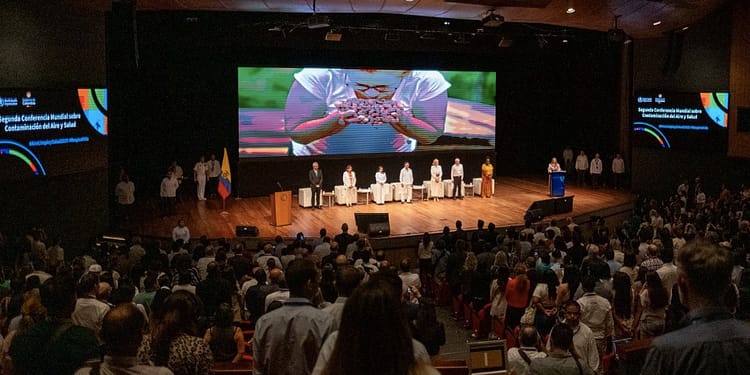The Second World Conference of the World Health Organization (WHO) on Air Quality and Health concluded with key advances. More than 50 countries, cities, and organizations made commitments to address this challenge and protect public health.
The conference, which took place in Geneva and Cartagena, brought together more than 700 participants from 100 countries. Attendees included government representatives, UN organizations, scientists, and health groups. During the event, a common goal was agreed upon to reduce the impact of air pollution by 50% to 30% by 2040. This ambitious goal aims to save millions of lives each year.
Commitments of Countries and Cities to Combat Air Pollution
One of the highlights was the intervention of Dr. Tedros Adhanom Ghebreyesus, Director General of the WHOAt the high-level session, he highlighted the urgent need for bold action. "It's time to move beyond commitments and take action," he emphasized. He urged governments to invest in sustainable solutions, such as clean energy and sustainable transport, in addition to implementing global air quality guidelines.
At the event, Colombian President Gustavo Petro highlighted the dire situation his country is facing. "Air pollution kills more than violence. Poisoning the air is a silent loss of life," he said. This commitment reinforces Colombia's determination to implement policies that benefit both the environment and public health.
Global Initiatives and Funding Commitments
During the conference, several countries and organizations announced important commitments. Colombian Environment Minister Lena Yanina Estrada pledged to intensify efforts to reduce air pollution. These measures include the use of clean technologies in industry and transportation, and the development of early warning systems to prevent forest fires.
Spain pledged to achieve carbon neutrality in its healthcare system by 2050. The United Kingdom, for its part, reaffirmed its commitment to combating air pollution. It will set new targets for fine particulate matter (PM2.5) and review its Air Quality Strategy to combat inequalities.
Brazil also took concrete steps, pledging to strengthen inter-ministerial cooperation. China, for its part, will focus on improving air quality standards and international cooperation. India highlighted its efforts to reduce the health effects of pollution, especially among vulnerable populations.
The Role of Cities and International Organizations
Cities also played a key role. Deputy Mayor of London, Mete Coban, representing the nearly 100 cities in the C40 Climate Leadership Group, highlighted cities' commitment to reducing air pollution. He called on other national governments to invest more in clean air solutions and strengthen monitoring systems.
The Clean Air Fund (CAF), for its part, pledged a USD 90 million investment over the next two years to support climate and health initiatives.
The Future of the Fight Against Air Pollution
Dr. Maria Neira, Director of the Department of Environment, Climate Change and Health at WHO, underscored the importance of the commitments made. "WHO is committed to helping countries translate these commitments into concrete actions," she said. With this foundation of global commitments and partnerships, the international community is better positioned to bring about significant change in the coming years.
This event has laid a solid foundation for advancing the fight against air pollution. The health of millions of people around the world now depends on the actions implemented in the coming years.






